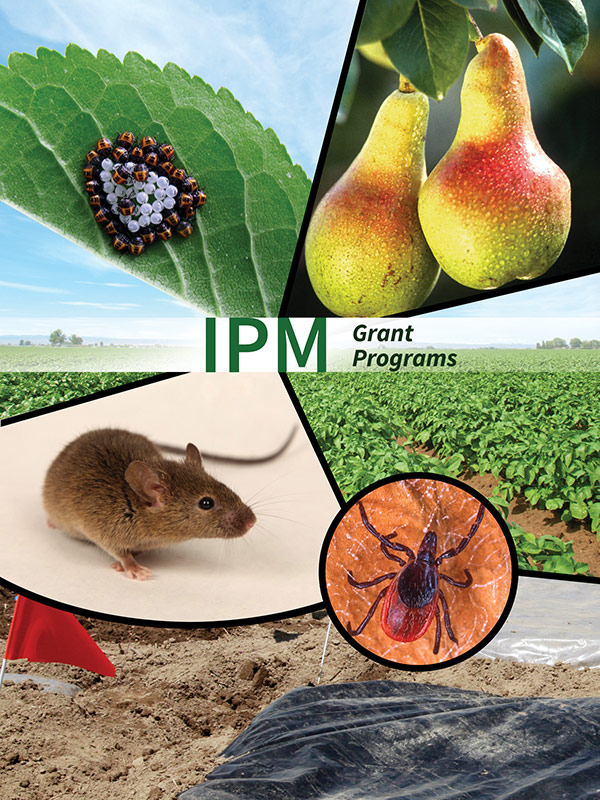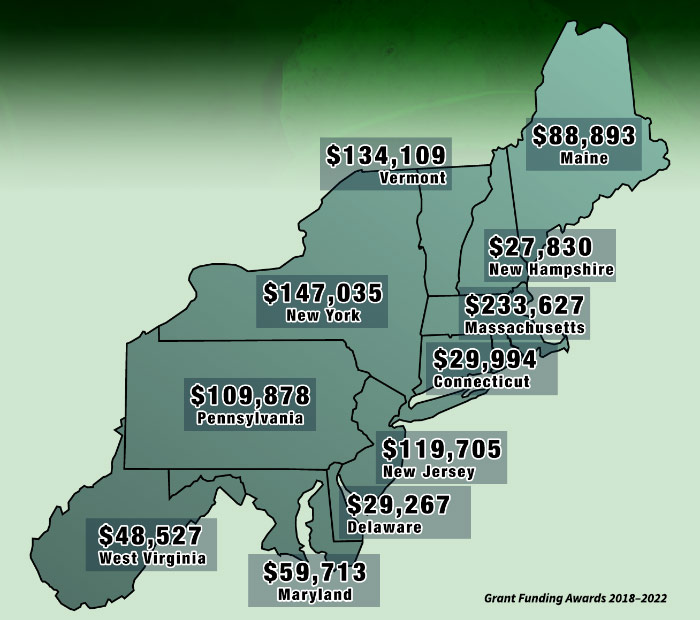Northeastern IPM Center Announces 2022 Grant Recipients
 |
Funding to be distributed through two grant programs
The Northeastern Integrated Pest Management (IPM) Center has announced its grant recipients for 2022.
Most years, the Center announces a list of projects funded through its Partnership Grants Program. This year, funding is also being awarded through the Center’s Pest Management Strategic Plans and Production/Management Profiles Grants Program.
About the Grant Programs
IPM Partnership Grants
Each year, through a competitive request-for-applications (RFA) process, the Center’s IPM Partnership Grants Program distributes funding to projects that further the mission of the Center, address or identify IPM priorities for the Northeast, and benefit the region at large.
The total funding distributed under the program this year is roughly $100,000, which is less than usual because the Center is reaching the end of its own current funding cycle. As a result, this year’s funded projects are limited to one year.
Each funded project falls under one of three categories: applied research, communications, and working groups.
Supporting Projects Across the Northeast
The Center’s remit includes fostering IPM adoption throughout the Northeast, which includes 12 states and the District of Columbia. As such, the Center makes every effort to ensure that the funding it distributes equitably serves the interests of the entire region, and each year, prospective project directors (PDs) throughout the Northeast are encouraged to apply.
The following infographic shows how the Center has awarded Partnership Grant funding, by state, throughout its 2018–2022 funding cycle.
 |
Leveraged Funding: The Indirect Power of Smaller Grants
Projects funded through the Partnership Grant Program often prove highly successful or shine a spotlight on bigger challenges in need of further exploration. PDs and their teams might then use what they have achieved with Center funding to make the case for larger grants that enable them to continue and expand their work.
 |
Through this leveraged-funding approach, between 2018 and 2022, Partnership Grant recipients have used $560,490 in Center funding to leverage $12.7 million in additional funding for the PDs, their partners, and their institutions. That represents a 1-to-23 rate of return.
The power of leveraged funding is perhaps most strongly illustrated by the broader efforts against two of the most concerning invasive species to proliferate in recent years: the brown marmorated stink bug and the spotted lanternfly. Projects dedicated to combating both pests began as Center-funded working groups that later went on to secure Specialty Crop Research Initiative funding directly from the USDA’s National Institute of Food and Agriculture—the same agency that funds the Center—to continue their work.
The Center’s remit includes fostering IPM adoption throughout the Northeast, and it makes every effort to ensure that the funding it distributes equitably serves the interests of the entire region.
Pest Management Strategic Plans and Production/Management Profiles
The Pest Management Strategic Plans (PMSPs) and Production/Management Profiles (PMPs) Grants Program aims to fund new and updated PMSPs and PMPs.
PMSPs and PMPs, Defined
PMSPs are developed with a regional group of growers and other stakeholders in the Northeast to identify the needs and priorities of a particular commodity, system, or setting requiring pest management. The plans document current pest-management practices and those under research-and-demonstration trial development.
PMPs provide the production or management story, including current pest-management practices, for a particular system—such as production of an agricultural commodity—and look at current research activities directed at finding IPM strategies.
The Center’s PMSP/PMP RFA specifically sought plans for crops, livestock, forestry, or other systems that do not have a plan, or for updates to outdated PMSPs or PMPs.
Coordinating Funding Opportunities
The Center typically funds PMSPs and PMPs outside the Partnership Grants cycle, but last fall, both were announced concurrently in hopes of eliciting a broad array of suitable applications.
This PMSP/PMP RFA specifically sought plans for crops, livestock, forestry, or other systems that do not have a plan, or for updates to outdated PMSPs or PMPs (those that are more than five years old), and offered a total of $30,000 in funding with a maximum of $15,000 per award.
“This is the first time in a number of years we’ve had the opportunity to incentivize the development of new or updated PMSPs and PMPs,” said Deborah Grantham, Center director. “The plans chosen for funding—along with the new projects selected through our IPM Partnership Grants Program—illustrate both the need and the capacity for IPM-driven solutions in the Northeast.”
List of 2022 Grant Recipients
Partnership Grants
This year’s funded projects all fall under the applied research and communications categories.
Applied Research
- Educating the next generation of extension through experiential learning of applied research through evaluating of efficacy and financial viability of water sprout removal for pear psylla IPM in three New England states (Elizabeth Garofalo, UMass Amherst)
- Operationalizing eDNA technology for disease vector mosquito surveillance and control (Allison Gardner, University of Maine)
- A systems approach to developing IPM for cattle producers in the Northeast; social, environmental, and economic analyses (Heather Darby, University of Vermont and State Agricultural College)
Communications
- IPM is for everyone: Enhancing the reach and impact of a virtual IPM education series (Matt Frye, New York State IPM Program, Cornell University)
Pest Management Strategic Plans
- Production/management profile for arthropod pests of horses in Maine (Allison Gardner, University of Maine)
- Hemp production/management profile for New York State (Marion Zuefle, New York State IPM Program, Cornell University)
“This year’s funding recipients illustrate both the need and the capacity for IPM-driven solutions in the Northeast.”
– Deborah Grantham, director, Northeastern IPM Center
Future Funding Opportunities
The Center typically releases its annual Partnership Grants RFA sometime in the fall. Stay tuned for further details.
To learn more about the IPM Partnership Grants Program, visit neipmc.org/go/bfgs.
The Northeastern IPM Center promotes integrated pest management for reducing risks to human health and the environment. If republishing our news, please acknowledge the source (“From Northeast IPM Insights”) along with a link to our website.
